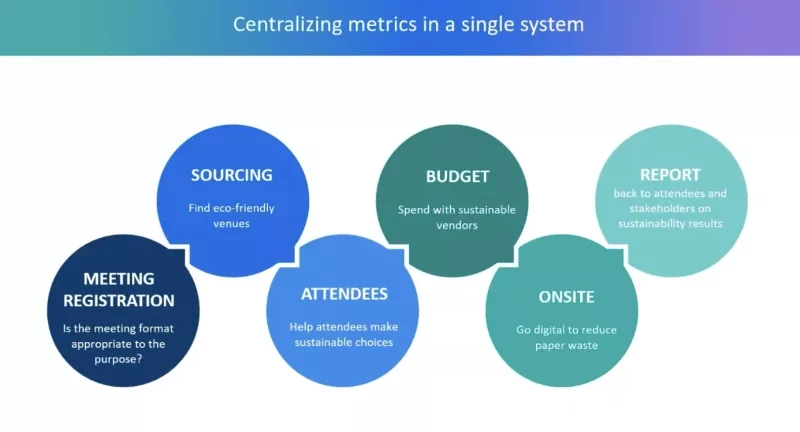Do you want to commit to delivering more sustainable events but are unsure how to get there? Don’t worry, you’re not alone.
Many planners struggle with what can feel like an overwhelming climate-conscious ‘to-do’ list, from waste management and recycling to sourcing greener venues and measuring the carbon emissions of the meetings and events you organise.
Improving these and other areas of your sustainable events strategy may require changes to your company’s culture, additional investment, new ideas and education. But it’s essential to start somewhere.
We all need to play our part in cutting CO2 emissions in half by 2030 (compared to 2017 levels) and reach a state of net zero CO2 emissions by 2050. Read on to learn best practices for building sustainability into your events.
What is a sustainable event?
Sustainable or green events are planned to minimise their environmental impact.
By partnering with environmentally conscious suppliers and focusing on improving how you plan and measure your events programme, you can reduce the amount of carbon emissions your events would typically produce and positively contribute to your organisation’s net-zero ambitions.
Sustainable events are also socially responsible and often result in higher attendance rates, positive brand recognition and reduced costs (resulting from greater efficiencies and less waste).
They create a positive impact and a lasting legacy for your host communities, sponsors and attendees.
Tips to make your events more sustainable
Conduct a sustainability audit
Carry out a sustainability audit of your current meetings and events to identify ‘quick win’ areas where you can make immediate improvements.
This could be something as simple as removing all single-use plastics or switching to meat-free and locally sourced food.
Get help from experts
Seek advice and support from industry experts and use the wealth of available tools, frameworks and resources to guide your planning and implementation.
Organisations such as Isla are helping to accelerate the events industry’s transition to a sustainable future by providing plenty of knowledge and tools.
Involve stakeholders
Bring team members and stakeholders along on your sustainable journey.
Sustainability should form part of every event planning decision, so ensure everyone is regularly engaged and briefed on goals, objectives and ideas to reduce carbon emissions.
Share your wins
Share your achievements and impacts to inspire others to follow your example. Use your event website, social media, attendee communications and pre and post-show surveys to communicate and gain feedback on improvements made to your sustainable events.
Check out our top ten green event ideas for more tips on making your events more sustainable.
5 steps to build a sustainable events strategy
If you’re just starting on your event sustainability journey, follow these five steps to get you on the road to reducing carbon emissions and creating a solid strategy for your meetings and events programme.
1. Assess where you are now
Every strategy should start with assessing where you are now and what goals already exist across your company or department.
To benchmark your organisation’s maturity when it comes to sustainability, here are five key questions to consider:
- What is your organisation trying to achieve?
- If your organisation has a sustainability mandate, does your meetings programme contribute to specific goals and targets?
- Does your team have sustainability KPIs, and if so, how are they being tracked?
- What data are you collecting that supports those KPIs?
- What data do you need to show progress?
Once you understand where meetings and events sit within your organisation’s sustainability journey, you can pinpoint areas where climate-positive decisions will have the most impact.
2. Develop an actionable sustainability policy
Developing a clear sustainability policy will depend on a) how far along your organisation is in its sustainability journey and b) your overall objectives.
Broadly speaking, your programme of events should have policies in place to:
- Eliminate single-use plastics
- Organise waste management and onsite recycling
- Encourage public transport use or ride-shares
- Choose local/seasonal food, donate leftover foods and provide more sustainable catering
- Opt for eco-friendly swag, prizes and giveaways
Prioritise suppliers who are signed up for the UNFCCC Race to Zero or partner with those companies who have taken the Net Zero Carbon Events Pledge.
The signatories for both these commitment-based, UN-backed initiatives will be able to share with you their pathways for reaching a 50% cut in emissions by 2030.
Partnering with these companies will help you to build a more sustainable supply chain that can provide measurement, tracking and shared resources.
Other ideas to include in your sustainability policy:
- Eliminate paper agendas, surveys and business cards from your events by using a mobile event app to engage with attendees.
- Ensure that RFPs are always sent to at least one venue with proven sustainability credentials. You can use the Cvent Supplier Network to easily source venues that are eco-certified, all at the click of a button.
- For in-person events, use digital lead capture tools to collect data so that you no longer need to collect or give out business cards.
- Deliver a contactless, self-serve check-in and on-demand badging experience so that you don’t need to print name badges unnecessarily.
3. Work with stakeholders to deliver on your sustainability goals
The importance of sustainability means that it doesn’t just lie with one individual or team. Communicating and educating your stakeholders about the importance of sustainability is central to effecting change.
Using a centralised platform to manage your events allows you to share guidance with other stakeholders, set approval or smarter decision-making policies, and track both carbon offset purchases and spending with sustainable venues and suppliers.
4. Involve Attendees to Drive Change
Use your attendees’ behaviour to drive action. For example, capturing delegate arrival and departure dates and times can allow for organised group transportation. Asking attendees to register for their meals can help you get a more accurate food and beverage estimate to avoid excess waste.
As the event organiser, you have the power to influence how attendees engage with your event – whether that’s by introducing vegan courses to banqueting plans, providing virtual elements through web and mobile apps to reduce multi-day or long-haul travel, or just by being more transparent with your carbon measurement data.
Attendees need you to have these options in place to justify their attendance to a low-carbon meeting during a time when more and more organisations are scrutinising business travel.
5. Use Measurement Tools to Track Sustainability Goals
Numerous carbon calculators aimed at event planners have been launched, including SAM, a free event sustainability carbon measurement tool.
SAM
SAM has been built on an open API so that it can be fully integrated with other platforms and technology, such as Cvent’s Event Marketing and Management Platform.
Most carbon calculators will measure the carbon output on accommodation, food, travel, room usage and communications. SAM’s unique feature is that it talks to delegates through the app to track travel habits.
Other resources include the TRACE platform and Proseed, both created by Isla, a non-profit organisation.
TRACE
The TRACE platform helps you to measure and minimise carbon emissions at live, hybrid, and digital events by calculating carbon and waste footprints and by providing in-app reduction tips and guidance.
The data is compliant with carbon emissions (Scope 1), energy consumption (Scope 2) and supply chain management (Scope 3) reporting. Plus, you can download detailed but easy-to-understand graphs and charts to embed into your event reports and debriefing documents.
Proseed
Proseed offers a free best practice framework designed to demystify the complexities of sustainable events by helping you understand what to ask your supply chain and what answers to expect.
It also provides actions to take to benchmark and reduce emissions – like how to measure energy usage, track travel footprint, limit food waste and build more eco-friendly sets.
Reset Connect
Other organisations that can help with training to measure your event emissions include Reset Connect. Three two-hour online workshops will walk you through what to measure, how to collect data, how to turn data into emissions calculations and then, how to use these calculations to create longer-term sustainability and reduction objectives.
Focus on event sustainability
Sustainability is more than a buzzword; it’s a core part of any organisation’s efforts to reduce carbon emissions and our impact on the planet.
Attendees, sponsors and speakers alike increasingly expect the events they attend to have green initiatives built into them. If your company is just at the start of its sustainability journey, then start small – with one or two objectives to get you going.
As you embark on making your events more sustainable, you'll also need the right event tech to help you. Cvent’s event technology supports your efforts to build more sustainable events with a range of tools to help you find sustainable suppliers and venues, as well as go paperless with digital solutions.
Commit to change today by analysing your own events’ impact on the planet – the resources, shared knowledge and technology are available to make it happen.






